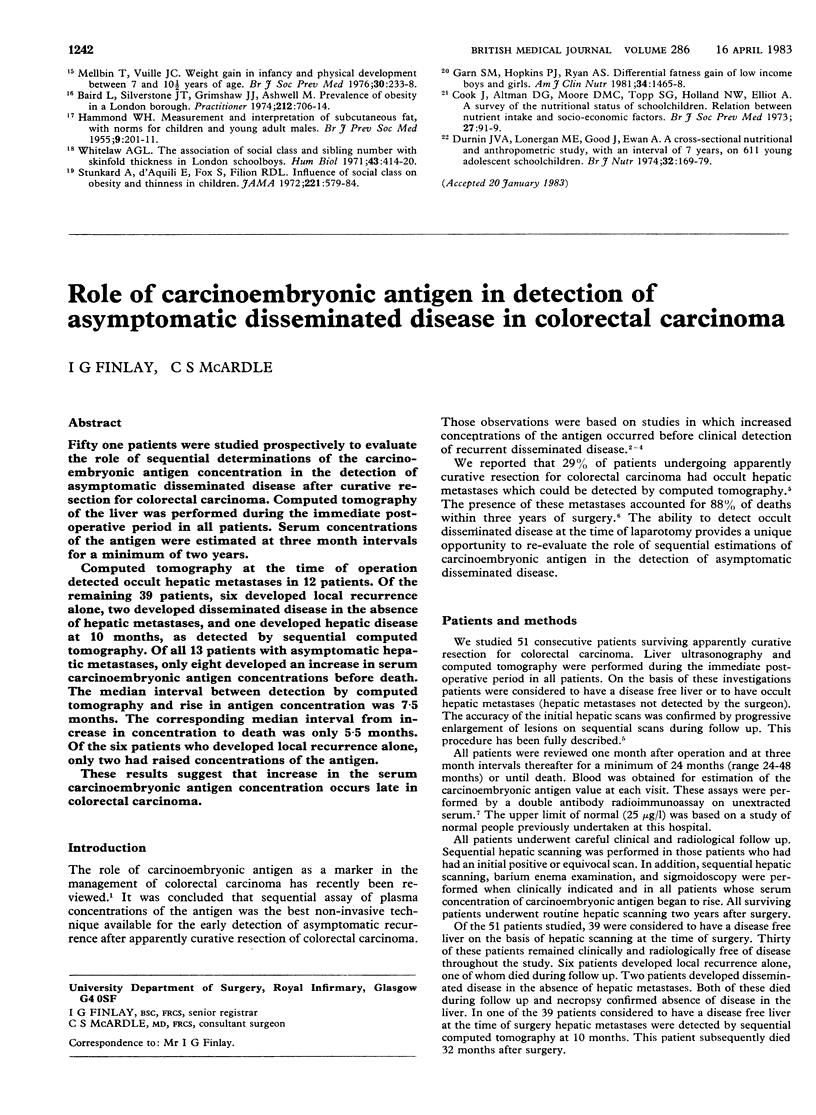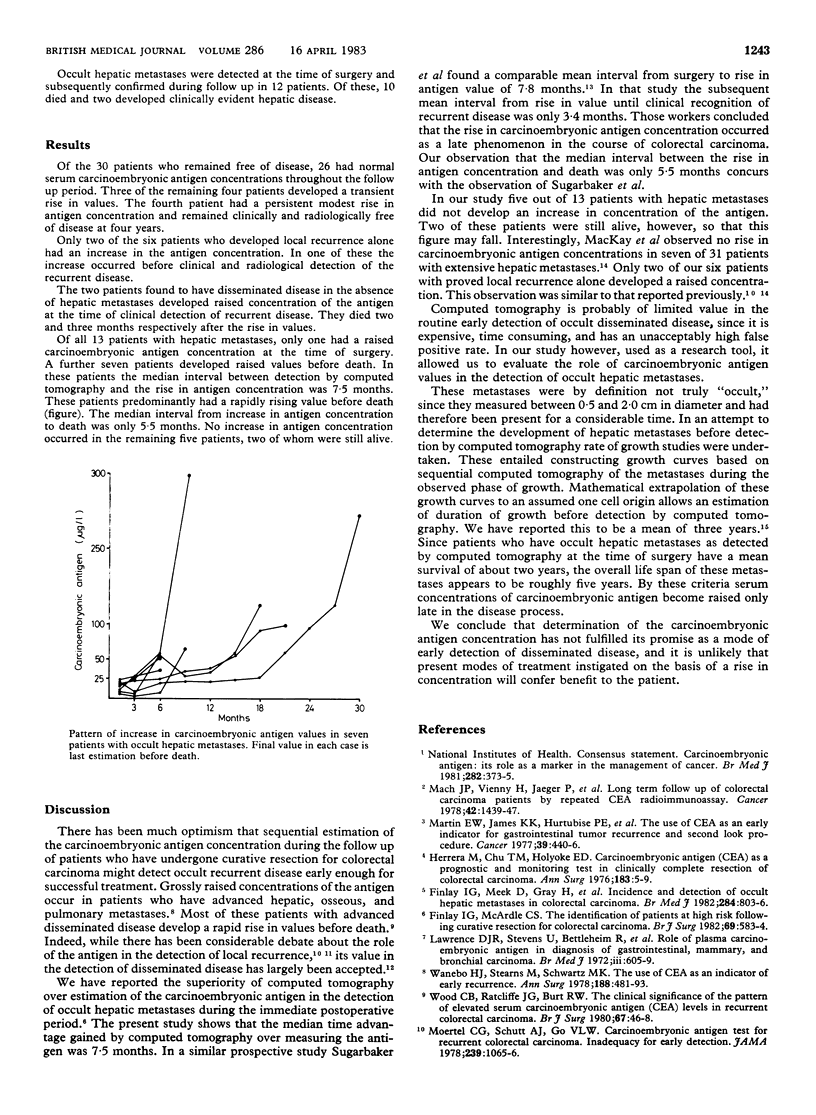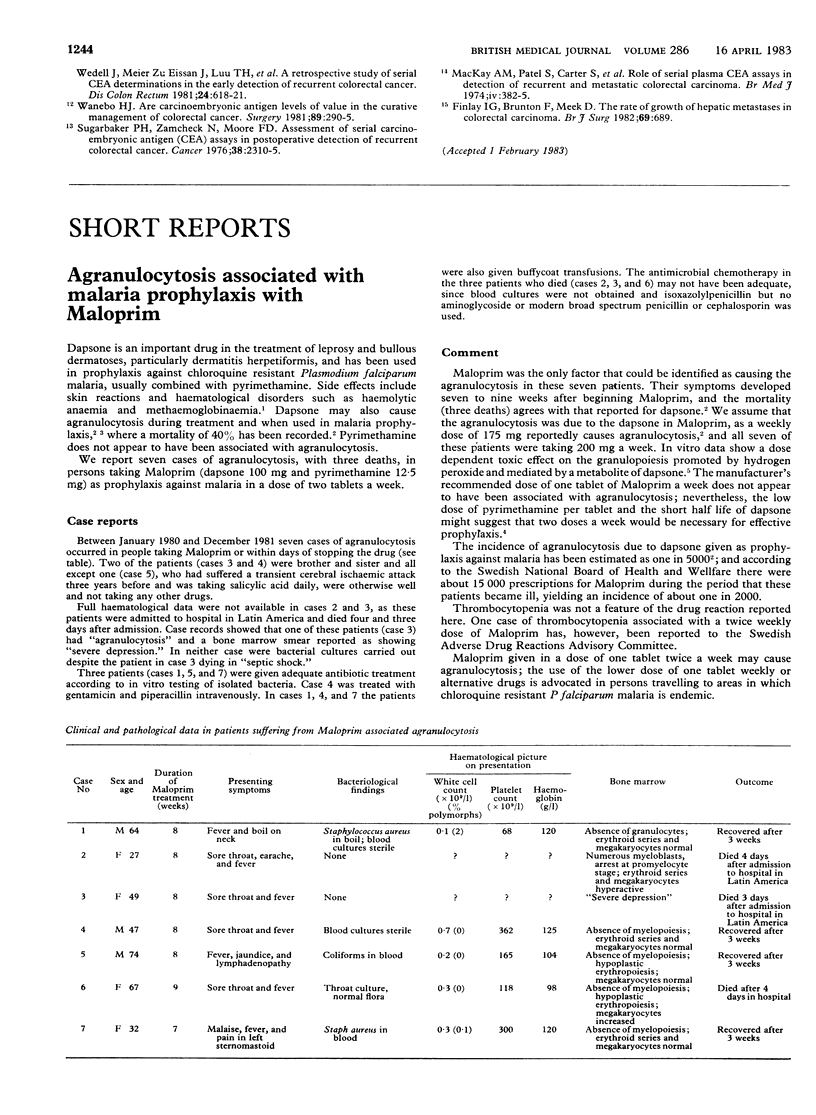Abstract
Fifty one patients were studied prospectively to evaluate the role of sequential determinations of the carcino-embryonic antigen concentration in the detection of asymptomatic disseminated disease after curative resection for colorectal carcinoma. Computed tomography of the liver was performed during the immediate postoperative period in all patients. Serum concentrations of the antigen were estimated at three month intervals for a minimum of two years. Computed tomography at the time of operation detected occult hepatic metastases in 12 patients. Of the remaining 39 patients, six developed local recurrence alone, two developed disseminated disease in the absence of hepatic metastases, and one developed hepatic disease at 10 months, as detected by sequential computed tomography. Of all 13 patients with asymptomatic hepatic metastases, only eight developed an increase in serum carcinoembryonic antigen concentrations before death. The median interval between detection by computed tomography and rise in antigen concentrations was 7.5 months. The corresponding median interval from increase in concentration to death was only 5.5 months. Of the six patients who developed local recurrence alone, only two had raised concentrations of the antigen. These results suggest that increase in the serum carcinoembryonic antigen concentration occurs late in colorectal carcinoma.
Full text
PDF


Selected References
These references are in PubMed. This may not be the complete list of references from this article.
- Finlay I. G., McArdle C. S. The identification of patients at high risk following curative resection for colorectal carcinoma. Br J Surg. 1982 Oct;69(10):583–584. doi: 10.1002/bjs.1800691008. [DOI] [PubMed] [Google Scholar]
- Finlay I. G., Meek D. R., Gray H. W., Duncan J. G., McArdle C. S. Incidence and detection of occult hepatic metastases in colorectal carcinoma. Br Med J (Clin Res Ed) 1982 Mar 13;284(6318):803–805. doi: 10.1136/bmj.284.6318.803. [DOI] [PMC free article] [PubMed] [Google Scholar]
- Herrera M. A., Chu T. M., Holyoke E. D. Carcinoembryonic antigen (CEA) as a prognostic and monitoring test in clinically complete resection of colorectal carcinoma. Ann Surg. 1976 Jan;183(1):5–9. doi: 10.1097/00000658-197601000-00002. [DOI] [PMC free article] [PubMed] [Google Scholar]
- Laurence D. J., Stevens U., Bettelheim R., Darcy D., Leese C., Turberville C., Alexander P., Johns E. W., Neville A. M. Role of plasma carcinoembryonic antigen in diagnosis of gastrointestinal, mammary, and bronchial carcinoma. Br Med J. 1972 Sep 9;3(5827):605–609. doi: 10.1136/bmj.3.5827.605. [DOI] [PMC free article] [PubMed] [Google Scholar]
- Mach J. P., Vienny H., Jaeger P., Haldemann B., Egely R., Pettavel J. Long-term follow-up of colorectal carcinoma patients by repeated CEA radioimmunoassay. Cancer. 1978 Sep;42(3 Suppl):1439–1447. doi: 10.1002/1097-0142(197809)42:3+<1439::aid-cncr2820420811>3.0.co;2-x. [DOI] [PubMed] [Google Scholar]
- Mackay A. M., Patel S., Carter S., Stevens U., Laurence D. J., Cooper E. H., Neville A. M. Role of serial plasma C.E.A. assays in detection of recurrent and metastatic colorectal carcinomas. Br Med J. 1974 Nov 16;4(5941):382–385. doi: 10.1136/bmj.4.5941.382. [DOI] [PMC free article] [PubMed] [Google Scholar]
- Martin E. W., Jr, James K. K., Hurtubise P. E., Catalano P., Minton J. P. The use of CEA as an early indicator for gastrointestinal tumor recurrence and second-look procedures. Cancer. 1977 Feb;39(2):440–446. doi: 10.1002/1097-0142(197702)39:2<440::aid-cncr2820390212>3.0.co;2-6. [DOI] [PubMed] [Google Scholar]
- Moertel C. G., Schutt A. J., Go V. L. Carcinoembryonic antigen test for recurrent colorectal carcinoma. Inadequacy for early detection. JAMA. 1978 Mar 13;239(11):1065–1066. [PubMed] [Google Scholar]
- Sugarbaker P. H., Zamcheck N., Moore F. D. Assessment of serial carcinoembryonic antigen (CEA) assays in postoperative detection of recurrent colorectal cancer. Cancer. 1976 Dec;38(6):2310–2315. doi: 10.1002/1097-0142(197612)38:6<2310::aid-cncr2820380618>3.0.co;2-l. [DOI] [PubMed] [Google Scholar]
- Wanebo H. J. Are carcinoembryonic antigen levels of value in the curative management of colorectal cancer? Surgery. 1981 Mar;89(3):290–295. [PubMed] [Google Scholar]
- Wanebo J. H., Stearns M., Schwartz M. K. Use of CEA as an indicator of early recurrence and as a guide to a selected second-look procedure in patients with colorectal cancer. Ann Surg. 1978 Oct;188(4):481–493. doi: 10.1097/00000658-197810000-00006. [DOI] [PMC free article] [PubMed] [Google Scholar]
- Wedell J., Meier zu Esssen P., Luu T. H., Fiedler R., van Calker H., Koldowski P., Schlipköter H. W. A retrospective study of serial CEA determinations in the early detection of recurrent colorectal cancer. Dis Colon Rectum. 1981 Nov-Dec;24(8):618–621. doi: 10.1007/BF02605759. [DOI] [PubMed] [Google Scholar]
- Wood C. B., Ratcliffe J. G., Burt R. W., Malcolm A. J., Blumgart L. H. The clinical significance of the pattern of elevated serum carcinoembryonic antigen (CEA) levels in recurrent colorectal cancer. Br J Surg. 1980 Jan;67(1):46–48. doi: 10.1002/bjs.1800670114. [DOI] [PubMed] [Google Scholar]


